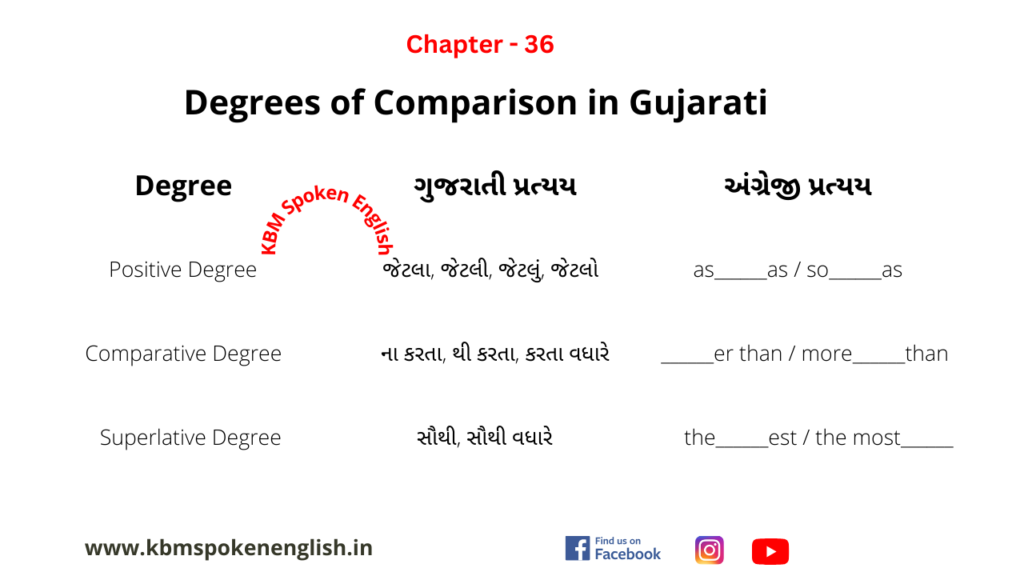Table of Contents

અંગ્રેજી ગ્રામર માં Degree comparison in Gujarati નો ઉપયોગ કોઈ એક વસ્તુ કે વ્યક્તિ ને કોઈ અન્ય વસ્તુ કે વ્યક્તિ સાથે સરખામણી કરવા માટે થાય છે.
Degrees of comparison માં Adjective(વિશેષણ) અથવા Adverb(ક્રિયા વિશેષણ) નો ખાસ ઉપયોગ થાય છે એટલે કે દરેક વિશેષણ અથવા ક્રિયા વિશેષણ ના degree પ્રમાણે ત્રણ રૂપ બને છે. માટે આગળ ના આ બંને ચેપ્ટરો જરૂર થી શીખી લેજો Adjective meaning in Gujarati અને Adverb meaning in Gujarati.
Three types of degree comparison in Gujarati with example
આવી સરખામણી ત્રણ રીતે થઈ શકે છે જેમ કે..
- Positive Degree comparison in Gujarati – સમાનતાદર્શક સરખામણી
- Comparative Degree comparison in Gujarati – અધિકતદર્શક સરખામણી
- Superlative Degree comparison in Gujarati – શ્રેષ્ઠતાદર્શક સરખામણી
Positive Degree meaning in Gujarati – સમાનતાદર્શક સરખામણી
Positive degree નો ઉપયોગ કોઈ વ્યક્તિ કે વસ્તુની સાથે સરખામણી કર્યા વગર થાય છે અથવા તો વસ્તુ કે વ્યક્તિ ની અન્ય કોઈ વસ્તુ કે વ્યક્તિ જેટલી જ સમાન બતાવવા માટે થાય છે માટે તેને સમાનતાદર્શક સરખામણી કહે છે જેમ કે..
Positive degree એ adjective અથવા adverb નું મૂળ રૂપ છે.
Adjective ‘tall’ = He is tall (તે ઊંચો છે)
Adverb ‘quickly’ = He is quickly (તે જડપી છે)
Dipak is as tall as Ashish. (દિપક આશિષ જેટલો જ ઊંચો છે.)
Dipak is not so quickly as Ashish. (દીપલ આશિષ જેટલો જડપી નથી.)
જેવી રીતે ગુજરાતી માં જેટલા, જેટલી, જેટલો, જેટલું પ્રત્યય નો ઉપયોગ થાય છે, તેમજ અંગ્રેજી માં as _____ as અને so _____ as પ્રત્યય લાગે છે.
Comparative Degree meaning in Gujarati- અધિકતાદર્શક સરખામણી
Comparative degree નો ઉપયોગ કોઈ વ્યક્તિ કે વસ્તુની કોઈ બીજી વ્યક્તિ કે વસ્તુની થી વધારે સારી બતાવવા માટે થાય છે માટે તેને અધિકતાદર્શક સરખામણી કહે છે જેમ કે..
Comparative degree એ adjective અથવા adverb નું બીજુ રૂપ છે. જેમ કે અંહી ‘taller‘
Dipak is taller than Ashish. (દીપક આશિષ કરતા ઉંચો છે.)
અંહી ગુજરાતી માં વધારે, થી વધારે, કરતા વધારે જેવા શબ્દો વપરાય છે તેવી જ રીતે અંગ્રેજી માટે _____er than લાગે છે અથવા more ______ than લાગે છે.
Superlative Degree meaning in Gujarati – શ્રેષ્ઠતાદર્શક સરખામણી
Superlative Degree નો ઉપયોગ કોઈ વ્યક્તિ કે વસ્તુની સૌથી થી સારી બતાવવા માટે થાય છે માટે તેને શ્રેષ્ઠતાદર્શક સરખામણી કહે છે જેમ કે..
Superlative degree એ adjective અથવા adverb નું ત્રીજુ રૂપ છે. જેમ કે ‘tallest‘
Dipak is the tallest boy. (દિપક સૌથી ઊંચો છોકરો છે.)
અંહી ગુજરાતી માં વપરાતા પ્રત્યય જેવા કે સૌથી, સૌથી વધારે ને અંગ્રેજી માટે the _____ est કે the most _____ લાગે છે.
Degree comparison in Gujarati examples
Example 1: Adjective – “tall”
- Positive: She is tall. (તેણી ઊંચી છે.)
- Comparative: She is taller than her brother. (તેણી તેના ભાઈ કરતા ઉંચી છે.)
- Superlative: She is the tallest in her class. (તેણી તેના વર્ગમાં સૌથી ઊંચી છે.)
Example 2: Adjective – “happy”
- Positive: He is happy. (તે ખુશ છે.)
- Comparative: He is happier than his friend. (તે તેના મિત્ર કરતાં વધુ ખુશ છે.)
- Superlative: He is the happiest person I know. (હું જાણું છું તે સૌથી ખુશ વ્યક્તિ છે.)
Example 3: Adjective – “beautiful”
- Positive: The garden is beautiful. (બગીચો સુંદર છે.)
- Comparative: The garden is more beautiful than the park. (ઉદ્યાન કરતાં બગીચો વધુ સુંદર છે.)
- Superlative: The garden is the most beautiful place in the city. (બગીચો શહેરની સૌથી સુંદર જગ્યા છે.)
Example 4: Adjective – “small”
- Positive: The puppy is small. (ગલૂડિયું નાનું છે.)
- Comparative: The puppy is smaller than the kitten. (ગલૂડિયું બિલાડીના બચ્ચાં કરતાં નાનું હોય છે.)
- Superlative: The puppy is the smallest in the litter. (કુરકુરિયું કચરામાં સૌથી નાનું છે.)
Example 5: Adjective – “good” (irregular)
- Positive: This book is good. (આ પુસ્તક સારું છે.)
- Comparative: This book is better than the other one. (આ પુસ્તક અન્ય પુસ્તક કરતાં વધુ સારું છે.)
- Superlative: This book is the best I’ve ever read. (આ પુસ્તક મેં ક્યારેય વાંચ્યું છે તે શ્રેષ્ઠ છે.)
Example 6: Adjective – “far” (irregular)
- Positive: The library is far. (પુસ્તકાલય દૂર છે.)
- Comparative: The library is farther than the grocery store. (પુસ્તકાલય કરિયાણાની દુકાન કરતાં દૂર છે.)
- Superlative: The library is the farthest place I’ve walked to. (પુસ્તકાલય એ સૌથી દૂરનું સ્થાન છે જ્યાં હું ગયો છું.)
Example 7: Adjective – “little” (irregular)
- Positive: He has little money. (તેની પાસે પૈસા ઓછા છે.)
- Comparative: He has less money than his friend. (તેની પાસે તેના મિત્ર કરતા ઓછા પૈસા છે.)
- Superlative: He has the least money in the group. (તેની પાસે જૂથમાં સૌથી ઓછા પૈસા છે.)
Example 8: Adjective – “much/many” (irregular)
- Positive: There are many books on the shelf. (શેલ્ફ પર ઘણા પુસ્તકો છે.)
- Comparative: There are more books on this shelf than on that one. (આ શેલ્ફ પર તે કરતાં વધુ પુસ્તકો છે.)
- Superlative: This shelf has the most books in the library. (આ શેલ્ફમાં પુસ્તકાલયમાં સૌથી વધુ પુસ્તકો છે.)
Example 9: Adjective – “well” (used as an adverb)
- Positive: She sings well. (તે સારું ગાય છે.)
- Comparative: She sings better than her sister. (તેણી તેની બહેન કરતાં વધુ સારી રીતે ગાય છે.)
- Superlative: She sings the best in the choir. (તેણી ગાયકવૃંદમાં શ્રેષ્ઠ ગાય છે.)
Example 10: Adjective – “badly” (used as an adverb)
- Positive: He performed badly in the exam. (તેણે પરીક્ષામાં ખરાબ પ્રદર્શન કર્યું હતું.)
- Comparative: He performed worse in the exam than in the midterm. (તેણે મિડટર્મ કરતાં પરીક્ષામાં ખરાબ પ્રદર્શન કર્યું.)
- Superlative: He performed the worst in the final exam. (તેણે અંતિમ પરીક્ષામાં સૌથી ખરાબ પ્રદર્શન કર્યું)